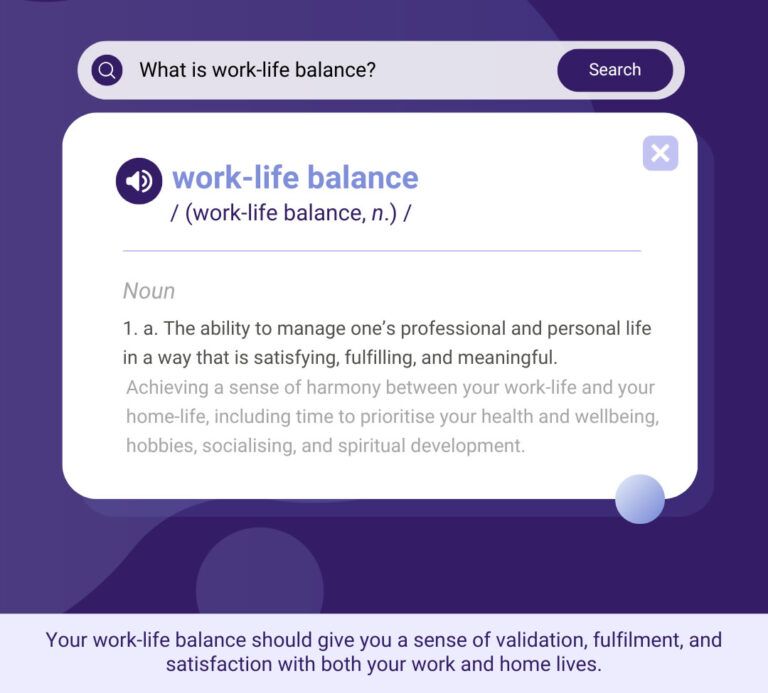
It’s a Friday evening, and Julia is sitting at her desk, staring at the computer screen. She should have finished work two hours ago, but now the clock reads 7:30 pm, and she’s yet to sign out. She had planned to attend a gym class to unwind from the stresses of the day, but a colleague rang her outside of her working hours, and before she knew it, she had completely missed her class. Now, she realises with exasperation that to be on time for dinner with friends, she would have needed to have left 15 minutes ago. Head in her hands, she groans with frustration.
The constant pressure to meet deadlines and exceed expectations at work has taken a toll on Julia’s physical and mental wellbeing. She feels exhausted, and although she knows that this isn’t sustainable in the long run, she doesn’t know how to begin sorting it out.
Julia’s story might seem like a familiar one. If so, it’s essential that employers learn what work-life balance is and how they and their employees can learn to master it.

What is work-life balance?
Harvard University defines work-life balance as the ability to manage one’s professional and personal life in a way that is satisfying, fulfilling, and meaningful.[Ref 1] It involves achieving a sense of harmony between one’s work-life and home-life, including time to prioritise health and wellbeing, leisure, family, and spiritual development. It also includes prioritising and effectively managing your time in a way that gives you a sense of validation, fulfilment, and satisfaction from both work and personal pursuits.[Ref 2]

Finding your work-life balance in a VUCA world
Referred to as ‘VUCA’, our contemporary world is marked by a sense of volatility, uncertainty, complexity, and ambiguity. In other words, our lives are mentally and physically demanding – they’re more complicated and unpredictable than ever. This means that for almost all of us, achieving balance between personal and professional spheres is becoming increasingly challenging. Whether you struggle to find the balance on a daily basis or you find things only get on top of you every so often, prioritising a good work and home-life balance can benefit everyone.
What benefits could an excellent work-life balance have in store for you?
Optimising work-life balance across your company could:
- Increase employees’ motivation and loyalty, leading to enhanced productivity and more success for the company.
- Improve staff retention rate and create a reputation that attracts high-quality applicants whose ethos aligns with your own.
- Improve attendance rates and reduce absenteeism due to lower rates of burnout and exhaustion amongst staff.
- Create a happier working environment for all, with less friction and frustration.
How does flexible working impact work-life balance?
In the corporate working environment, many of us have come to work in new ways, including working entirely from home or engaging in a hybrid working model with a mixture of in-person and virtual working hours. This flexibility can be a double-edged sword, presenting both challenges and benefits.
Benefits of flexible/remote working
- Flexible working arrangements could give you more control over your work schedule. This could help you fit in personal responsibilities (doing the school run, exercising) around professional ones (meetings, deadlines), often leading to an improved work-life balance.
- For example, working from home can mean that you should find it easier to eat well and save money. Instead of grabbing lunch from a café or shop, you’ll have the facilities and potential access to a range of ingredients to make well-rounded, healthy lunches and snacks.
- Not having to commute saves money and time.
- Often, flexible working means that people can work at hours which suit them the best – e.g., some people might prefer to get up earlier and finish earlier in the afternoon, whereas others might split their day with a walk or an exercise class, scheduling their working hours around this.
- When doing focused work, it can be easier to concentrate in a quiet space at home (if you have it), as opposed to the often-frenetic environment of the office.
- Overall, according to research, working from home resulted in an overall increase in work satisfaction and perceived work-life balance among 73% of surveyed employees.[Ref 3]
Challenges presented by flexible/remote working
Despite its many benefits, remote working doesn’t suit everyone.
- Remote working can leave some people feeling isolated or lonely. If you aren’t physically in the same room as your colleagues, it can be hard to feel like a key member of the team.
- We also often underestimate the importance of incidental communications to our mental wellbeing.
- What do we mean by this? We’re talking about the exchange of a few words at the printer or the coffee machine, a word of reassurance or praise from a colleague, or a joke in the staff room as you eat your lunch. It’s not even just about the usual office interactions – it could be as simple as the things you see or the people you meet on your way to work. This might be a smile or comment from your favourite local barista, a chat with the security guard as you enter the office, or a greeting from the conductor on the train. Ultimately, we’re social animals who need these daily interactions for the good of our mental and emotional wellbeing.
- When working at home, it can be easy to get distracted by aspects of your home life. This might include your children playing together in the next room, your partner or housemate chatting to you, or household jobs that need doing, e.g., sorting the washing, unloading the dishwasher, or tidying your living space. It can be hard to mentally ‘go to work’ if you’re not leaving the house.
- Owing to the blurred lines between personal and professional life that often occur if you’re working from home, it can be helpful to create a sense of separation between your work and your leisure. If where you live is restricted in terms of space, this may not always be possible, but there are smaller measures you can take to stop your work from overflowing into your home life. In these circumstances where physical separation is more difficult, this might be as simple as shutting your laptop down and putting it away at the end of the working day or perhaps tidying your desk and closing your notepad with your to-do list inside.[Ref 4]
- When you’re trying to switch off at the end of the day, it can be hard to physically separate yourself from your job, which might also result in a mental struggle to put your work to one side. If you’re finding this difficult, you could aim to confine work to a specific area of your home and close the door on it after a set time, just like you would if you were leaving the office. Although it can be tempting (and, depending on the space you have available, often necessary) to work from your sitting room or kitchen, if your living environment allows, having a designated workspace that doesn’t mix with other areas of your home is a great idea.
What are the consequences of work-life imbalance?

- Work-life imbalance can lead to a feeling of loss of control over both personal and professional lives.
- It can result in reduced time for self-care, maintaining relationships, personal growth, and other activities that add joy to life.
- This leads to forgetfulness, impaired concentration, and a lack of focus.
- Continuously feeling stressed and anxious ultimately develops into prolonged irritability, anger, and detachment from others.
- Those suffering from a work-life imbalance might become more cynical or critical at work and home.
- A poor work-life balance results in the prolonged activation of the overall stress response which weakens the immune system, making one more vulnerable to sickness and disease.
- In addition, stressed people are often more likely to turn to alcohol or substance use as a coping mechanism, which can further exacerbate health problems and negatively impact overall wellbeing.
Overall, the causes and consequences of a work-life imbalance are manifold, and it’s important that every working individual is able to find a better balance, no matter the job or the person. In Part 2 of our Work-Life Balance series, you’ll learn how to turn the tides on your work-life imbalance, ensuring you’re equipped to thrive at both work and home.
References & External Links
- Iona Lupu and Mayra Ruiz-Castro, ‘Work-Life Balance Is a Cycle, Not an Achievement’, Harvard Business Review.
- Rick Hughes book, ‘Get a Life!’.
- Walter Orechwa, ‘How Workplace Flexibility Improves Work-Life Balance?’.
- ‘Flexible working hours can benefit work-life balance, businesses and productivity’, International Labour Organisation.
Please note, these are external links away from the Thrive4Life website. We are not responsible for the content of external websites.










